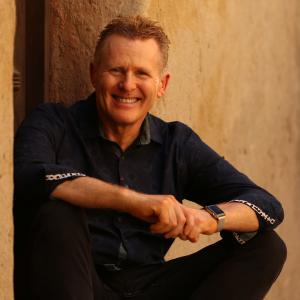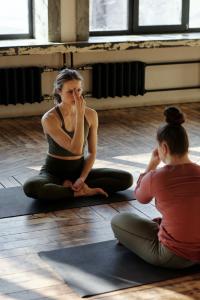Finding Our Happiness Teachers
On our journey towards a more happy life, we can learn from others the skills for how to live our lives well. The beautiful, awaken souls can be our teachers.
NEWPORT BEACH, CALIFORNIA, USA, September 20, 2020 /EINPresswire.com/ -- Have you ever wanted to learn something? Think of anything you’ve had a desire to do well at — piano, lacrosse, cooking, yoga. We can learn just about anything if we have a good teacher who knows the subject well. Like that teacher, we, too, can get good at things.Years ago, my son had an interest in learning the cello. We started to look for someone to teach him, and we found someone locally who was a renowned cellist — someone who had once played for the Queen of England, but who was also willing to teach, and was good at teaching, too, with patience, understanding, and skill.
My son has since abandoned the cello — I hope temporarily, though life often sends us down new and different paths than the one we set out on. But through his teacher, he learned to make beautiful music.
When it is our desire to learn a new skill, we seek out teachers, and it’s really helpful to find the very best teachers we can. Mastering a craft through this kind of tutelage is easiest when three things are in place: passion, a little skill, and excellent instruction. Even if we don’t have that second part, the natural talent, I still think we can get really good at something through emulating our mentors and trying hard — with the more skillful the teacher, the better.
Imagine if Ludwig von Beethoven were your son. Who would you find to be his teacher? Ludwig’s parents found him a good one: Joseph Haydn, fresh off a triumphant voyage to London from Vienna, where both teacher and student resided.
Now, it’s not necessary for your teacher to be one of the greatest practitioners around. You can learn a lot from anyone who knows something you want to learn, providing they’re willing to teach. If someone has something to impart that will help us to reach our goals, we owe it to ourselves to at least ask them about it, but maybe even to form a student-teacher relationship that can get us where we want to be in time.
When it comes to happiness, I really don’t think there’s much difference when it comes to gaining that mindset, which is also a kind of skill. I think we all know people who appear to be naturally happy, but even with these people, there’s a lot of work to cultivating sustained happiness. It is worthwhile to ask them how they do what they do.
Teachers help us to get good at what it is we wish to achieve. It’s possible to reach our goals without them, but that way is far more difficult than picking the brain of someone in the know. If we want to find contentment and happiness in life, we need to find the people who are living life well, and we need to go to them and sit at their feet (figuratively speaking) to listen and learn.
Living a peaceful and happy life isn’t easy, but our happiness people may come from many different places and sources. At this point, you may be wondering where to find them. The good news is that you’ve found this article. I have been studying happy people living contented lives for decades, and I have some valuable information to impart from my years of observations and study. Look at you — you’re already studying! That means you’ve taken a first step, or maybe by now, after reading several of my writings, you’re even further on your way to reaching your life goals.
Our teachers don’t have to be far away or hard to find. Anyone who appears to be happy can tell us how they arrived at the sense of contentment that is clear to everyone who observes them.
To find a happiness teacher, look for those people who are doing life really well.
When I was younger, I was very healthy and fit, and I noticed that many other young people were, too — but I also noticed that people don’t always stay this way. I wanted to stay healthy and active throughout my life, so I decided to ask others how to do so.
Once I was backpacking with a group of people in the High Sierras. We were hiking 12 miles a day with 50-pound packs on our back. On this trip, there were some older hikers who participated right along with the rest of us. Of these, three people were in their 70s and one was in his 80s, and all of them were in great shape.
I asked these older hikers what their secret was to be in good health later in their lives, and they all told me the same thing: they had worked at it and worked at it, all throughout their lives, and as a result, now they could enjoy the kind of vigor that allowed them to pursue literal peak experiences, like a mountain hike.
What I came to understand from talking to these teachers was that I can’t very easily get back in shape when I’m 60. Instead, I need to stay in shape all my life. Their good advice and example have helped me to stay very fit and healthy all my life. These are my teachers, and they’ve helped me to shape my life.
As we navigate through life and we see someone doing well, or doing something we’d like to emulate, we will do well to take notice. Note that it isn’t things we’re looking for as we seek out our happiness models. They may have a beautiful house, a sharp car, or an expensive boat, but these things aren’t what make them happy. Happy people can be found at all walks of life. We should instead be looking at people’s lifestyle or way of living. We’re looking for people whose lives seem to be going very well in a way that makes them visibly contented.
Here’s an exercise to try: The next time you are on an airplane, take a good look at those people who are sitting in business or first class. Do they seem happier? In my experience, they don’t appear to be any happier or sadder than people sitting in coach. What we can buy doesn’t seem to be an actual qualifier of happiness. Happiness is a lifestyle — a way of living — and we’re looking for those teachers who seem to have attained it. These people can be found anywhere.
Another one of my own teachers is a person I used to go hiking with. This woman loved nature, loved the outdoors, and I never once saw her get angry.
I asked her about this, and here is what she told me: “I get angry, but I always pause before I respond to people who make me angry. This allows me to respond in calm instead of anger.”
My teacher found that staying calm was a truer route to happiness than blowing up and venting her anger. She told me that getting into fights takes work, and the results of the work were not conducive to her happiness. Instead, she decided to work at cultivating calm, and this was the work that paid off. What I learned from this teacher was that if I wanted to have contentment, I would need to pause and not always express the feelings I had inside of me.
Another teacher I had was a client of mine. This person was very spiritual, and she asked me, “Do you know that the number one thing we can do to develop our spirituality is meditation?”
At the time, I was an intermittent meditator, and I had learned from Dr. Herbert Benson, the great mind-body connection expert at Harvard University, that the chief benefits of meditation were physical — reducing blood pressure, decreasing anxiety, helping with memory and sleep.
At the time my client mentioned the benefits of meditating, I found that I liked it, but I didn’t make a lot of time for it. I did some looking, and I found out that my client was right, and there were spiritual benefits to meditation, in addition to the physical ones. I dove in with gusto, and I am happy to report that I’ve been meditating regularly for over 30 years.
When I was in my senior year of university, I took a seminar on the psychologist Abraham Maslow. Maslow is considered one of the preeminent American psychologists, and if you have ever heard phrases like “self-actualization” or “peak experiences” (I mentioned this one earlier in this article), then you are familiar with his groundbreaking work.
The fascinating thing about Maslow is that he was a psychologist who did not study pathologies. Instead, he researched the people he found that he considered extremely healthy and he wrote books about them. He studied health. I remember being introduced to his work and thinking that this is what I wanted to do, too. I realized that living a healthy, beautiful life was possible, and I was going to learn everything I could about it. In this way, Maslow was one of my teachers. Learning about him was like being given a ticket to a concert hall and hearing a beautiful melody and deciding the experience was so beautiful and moving that I was going to play it for myself someday.
If you’re reading this article, you have a deep desire to learn about happiness and to find contentment and peace in your life right now. Otherwise, you’d be off doing something else. I can tell you, discovering and cultivating happiness is possible, but it does take some work. I’ve been working at it my whole life, and it has paid off: I am happily living my best life, and I intend to keep doing so.
We have the idea that if people’s lives are going well, they’re just lucky. This isn’t true. I once met Mr. Rogers — Fred Rogers — and his wife, Joanne. Mr. Rogers had a very loving persona on his children’s television show, but anyone who knew him would tell you that he was who he was on TV. He didn’t go home and act differently.
I remember Joanne saying, “You know how he gets this way? He works at it every day.” I was surprised. Mr. Rogers was Mr. Rogers through hard work; he wasn’t born that way. He worked at it, and he worked at it hard.
People like Mr. Rogers do things to ensure that their lives go well. That kind of lovingkindness and contentment are the result of effort and attention. It’s similar to meeting someone who is extremely fit. Guess what? This person is doing things to stay physically fit and healthy, just as we can “work out” to stay emotionally fit and healthy.
Happiness does take effort, but there are a lot of things we can do to make our lives better. As one example, I meditate every day for at least 90 minutes. This is a practice I have taken on, and it’s one that fills me with calm and reassurance. There is a sacrifice of sorts, however. The hour and a half that I spend meditating each day takes away time that I could spend doing other things, but many of those things aren’t good for my soul. Meditation is, so I keep doing it. I make time for it every single day.
Throughout our lives, we’re going to meet people who just shine. If we are wise, we will approach them to find out how they got to that point in life, and then they can be our teachers.
All through history, there have been great thinkers who have lived their lives very well. If we are people of faith, we might look to our faith leaders as teachers. A Buddhist may look to the Buddha’s example; a Christian may think of the life of Christ. There are examples throughout our faith we can emulate. I know that I like to consider the life of St. Francis of Assisi — a beautiful soul who lived simply and close to nature.
Another wonderful example is Ramana Maharshi, a Hindi sage and liberated being, or jivanmukta, who taught that our real nature is happiness. He was a gentle, beautiful soul who loved people, and many would gather around him just to watch him and listen. Even children were fascinated just to look at him.
When we choose a teacher, like any of those I’ve mentioned here, we don’t just learn from them. We learn to be like them. There are so many wonderful teachers throughout history that we can learn from. We just need to listen to our heart and pay close attention to who is drawing us to them. When we hear their story, we can then say, “OK, this is what they did. How can I do that, too?”
One thing I teach over and over is that we can have beautiful lives. It takes focus, attention, and work — but it’s so worthwhile. Why shouldn’t we learn to shine, just as our teachers do?
How do we do that? We must commit to living the life we seek and then never give up. Then maybe someday we’ll be teachers for others in their journey toward peace and happiness.
If you would like to learn more, the latest episode of the Happiness Podcast, hosted and created by Dr. Robert Puff, is now available. It is titled, "#290 Happiness – Finding Our Happiness Teachers" and can be listened to at:
https://www.happinesspodcast.org/290-happiness-finding-our-happiness-teachers/
Links to listen to the Happiness Podcast:
http://smarturl.it/HappinessPodcast
About the Happiness Podcast hosted by Dr. Robert Puff:
Do you ever wonder what it takes to lead a peaceful, happy life? Are you curious about the specific steps involved in a self-actualized, limitless life? Are you struggling with anxiety or depression? Or are you just plain tired and want some help? We explore all these concerns and more every week on the Happiness Podcast, which has been downloaded over 8 million times since its inception. Happiness does not happen by chance, but because we take specific actions in our lives to create it. Dr. Robert Puff, Ph.D., author of 13 books, TV show host, Psychology Today blogger, and corporate trainer, has been studying the actions it takes to reach the highest levels of human achievement for decades, and he wants to share what he knows with you. Come and explore, along with millions of others from the Happiness Podcast, Dr. Puff books and Psychology Today blog, private clients and corporate workshop attendees, the specific steps to take so that you can soar in your life.
Dr. Robert Puff, Ph.D.
Happiness Podcast
+1 714-337-4889
email us here
Visit us on social media:
Facebook
Twitter
LinkedIn
#290 Happiness - Finding Our Happiness Teachers
Legal Disclaimer:
EIN Presswire provides this news content "as is" without warranty of any kind. We do not accept any responsibility or liability for the accuracy, content, images, videos, licenses, completeness, legality, or reliability of the information contained in this article. If you have any complaints or copyright issues related to this article, kindly contact the author above.



